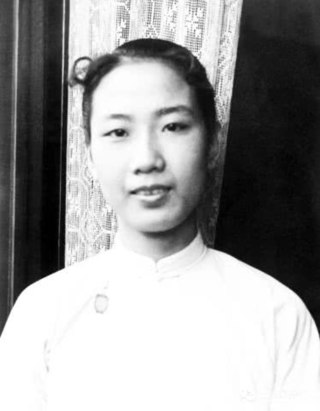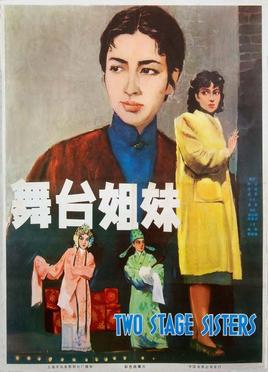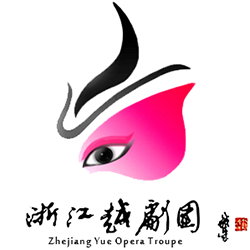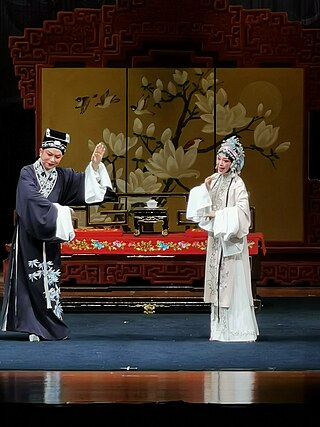
Traditional Chinese opera, or Xiqu, is a form of musical theatre in China with roots going back to the early periods in China. It is an amalgamation of various art forms that existed in ancient China, and evolved gradually over more than a thousand years, reaching its mature form in the 13th century, during the Song dynasty (960–1279). Early forms of Chinese theater are simple; however, over time, various art forms such as music, song and dance, martial arts, acrobatics, costume and make-up art, as well as literary art forms were incorporated to form traditional Chinese opera. Performers had to practice for many years to gain an understanding of the roles. Exaggerated features and colors made it easier for the audience to identify the roles portrayed.
Yue or Yueh may refer to:
Yueju may refer to the following regional Chinese opera genres:

The Shanghai Oriental Art Center, abbreviated SHOAC, is one of the leading performance and cultural facilities in Shanghai. The five interconnected hemispherical halls or "petals" are shaped to resemble a butterfly orchid from above. They comprise the Entrance Hall, the Concert Hall, the Opera Hall, the Performance Hall, and the Exhibition Hall. The high-tech ceiling changes color during the night to reflect the nature of the performances inside. Located off Century Avenue in Pudong, the SHOAC was opened with a New Year's Eve concert in 2004 and officially opened on July 1, 2005.

Yuan Xuefen was a noted performer in the Yue opera genre of Chinese opera. She has been called "arguably the most important actress in the recent history of Yueju [Shaoxing] opera". The only other artist to be ranked with her is Fu Quanxiang.

Two Stage Sisters is a 1964 Chinese drama film produced by Shanghai Tianma Film Studio and directed by Xie Jin, starring Xie Fang and Cao Yindi. Made just before the Cultural Revolution, it tells the story of two female Yue opera practitioners from the same troupe who end up taking very different paths in their lives: "one succumbs to bourgeois affluence and privilege, while the other finds inspiration and fulfilment in the social commitment associated with the May Fourth movement and the thought of Lu Xun.” The film documents their journey through abusive feudal conditions in the countryside before achieving success and prestige on the stage, meanwhile historically following Shanghai's experience under Japanese and KMT rule. This original screenplay depicts the socio-political changes encompassing China from 1935-1950 through the theatrical world of Shaoxing, and accordingly mixes both a Chinese aesthetic with Hollywood and socialist realist forms. The main protagonist is said to be based on the life of Xie Jin's friend and opera-veteran Yuan Xuefen.

Yue opera, also known as Shaoxing opera, is a popular Chinese opera genre. Only Peking opera is considered more popular nationwide.
Fu Quanxiang was a well-known Chinese actress of Yue opera. In the Chinese press she was named as one of the ten leading female actors in Yue opera. In the view of others she was one of only two truly famous artists, the other being Yuan Xuefen.
Wang Wenjuan was a noted performer in Yue opera. She was well known for playing the title role Lin Daiyu in the 1962 film of Dream of the Red Chamber, an adaptation of a work by Cao Xueqin.

Shanghai Jingju Theatre Company is a theatre company based in Shanghai, China, which produces Jingju. It was founded in 1955, with Zhou Xinfang its director. The Shanghai Beijing-Opera Theatre is at 168 Yueyang Road, Xuhui, Shanghai.

The Zhejiang Yue Opera Troupe is a troupe in Hangzhou, China, founded in 1952 and dedicated to Yue opera. The Zhejiang Yue Opera Troupe is one of the most famous Yueju troupes.

Bi Chunfang was a Chinese Yue opera performer, known as the founder of the "Bi style" of Yue opera. Born in Shanghai of Ningbo ancestry, she joined the Xuesheng troupe led by Yuan Xuefen in 1948, later joining the Dongshan troupe led by Fan Ruijuan and Fu Quanxiang. She partnered with Qi Yaxian.
Xu Yulan was a Yue opera singer-actress who plays Sheng roles.

Xiju, also known as Wuxi opera, is a genre of opera which originated in the southern region of the Yangtze River Delta in China. It evolved from "Tanhuang" (滩簧), a folk opera art in the region of Wuxi and Changzhou of Jiangsu province. As one of the main local operas in Jiangsu Province, Wuxi opera has been reputed as "a piece of plum flower in Taihu Lake", a title given to the three major operas in East China, alongside Yue opera and Huangmei opera.

Zhejiang Xiaobaihua Yue Opera Troupe is a professional all-women Yue opera troupe in Hangzhou, Zhejiang, China. Along with Zhejiang Yue Opera Troupe and Shanghai Yueju Troupe, it is one of China's most famous Yue opera troupes. It has toured the U.S., France, Holand, Belgium, Japan, South Korea, Singapore, Thailand, Hong Kong, Macao, Taiwan and other places.
Mao Weitao is a Chinese Yue opera actress-singer who usually portrays Sheng roles. A founding member of the acclaimed Zhejiang Xiaobaihua Yue Opera Troupe who also served as its president from 1999 to 2018, Mao Weitao is a household name among Yue opera listeners. For non-opera listeners, she is best known for her portrayal of Dongfang Bubai in the 2001 TV series Laughing in the Wind.

The Fujian Fanghua Yue Drama Troupe is a Chinese Yue opera troupe based in Fuzhou, Fujian. It was founded in 1946 by Yin Guifang in Shanghai as Shanghai Fanghua Yue Drama Troupe and relocated to Fujian in 1959.
Wang Jun'an is a Chinese Yue opera singer-actress who specializes in young sheng (male) roles. One of Yin Guifang's most prized students, she is the top star of the Fujian Fanghua Yue Drama Troupe based in Fuzhou. Wang Jun'an won the Plum Blossom Award in 2015 and the Magnolia Stage Award in 2014. She is affectionately nicknamed "White Horse" by her large fanbase, which "rival[s] that of a famous pop star".
Liu Housheng was a Chinese theatre director, critic, scholar, and playwright. As Vice President of the China Theatre Association, he co-founded the Plum Blossom Award in 1983. He received the Lifetime Achievement Award of the China Theater Awards in 2009.

Fan Ruijuan was a prominent Chinese opera singer. She was one of the stars of the Yue Opera which features actresses in male roles. She is remembered in particular for her many performances of Liang Shanbo in The Sad Story of Liang Shanbo and Zhu Yingtai, an opera based on the folk tale Butterfly Lovers, which she also played in the United States in 1989. In 1990, she toured widely in Europe. During a stage career lasting 50 years, she played over a hundred different roles, last performing in 1993 in a television series. She held various high-level official appointments including director of the Chinese Dramatists Association.












